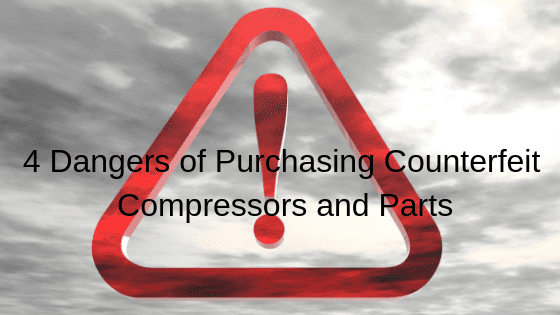When most people think of counterfeit products, it is usually electronics and luxury items that come to mind. However, a shocking amount of piracy is taking place in unlikely industries such as the HVAC industry. In fact, the problem has grown into an international phenomenon that is costing HVAC manufacturers millions of dollars per year. As a result, manufacturers like Danfoss have implemented some methods for identifying their products as legitimate, which serves to protect themselves and their customers.
How to Catch a Counterfeit
There are several ways you can identify a counterfeit Danfoss compressor today. The earliest protective measures included serialization of the compressor body, as well as holograms that include the Danfoss logo. You should be able to find both of these markers on your compressor packaging. You may notice that special logos have been stamped in unlikely places on the compressor to identify it as authentic. More recently, companies have also incorporated QR codes which take you to a registration page to help identify whether or not the product is real. If the serial number on the QR code page does not match the other labels on the compressor, you will know that it is a fake.
Aside from these advanced methods of detecting counterfeits, there are also some less complex things to look for. For instance, all Danfoss compressors are either black or blue. All of the labels placed on these compressors come with pre-cut corners so that if someone attempts to remove the label at a later time, the corners will be separated. This is a clear indication that the compressor has been tampered with.
Other Considerations
Aside from the issue of counterfeit products, there are also some other common dangers in the HVAC market as well. For instance, some companies are taking old Danfoss compressors, refurbishing them with off-brand components, and then selling them as new. While the outer case of the compressor may be legitimate, the inside parts are not. The best way to combat this is to ensure that you are shopping only with a reputable dealer or installer. Any deal that appears to be too good to be true should be cause for concern. When in doubt, it is best to contact Danfoss directly so that they can walk you through the identification steps to determine whether or not the compressor is authentic.
Why It’s Important
You may be wondering why counterfeit compressors are really a problem in the first place. After all, they’re really the same thing, only cheaper, right? Wrong. Fake compressors are known to break down and can cause significant damage to the rest of your commercial HVAC system if you’re not careful. Oftentimes fake coils or other components can cause internal damage to a commercial compressor that cannot be repaired. The worst part is that after the damage has happened, you will soon find out that the repairs are not covered by any warranty because the product is not authentic.
It is in the best interest of consumers and manufacturers alike to take proactive steps against counterfeiting today. Fortunately, there are several identifying markers that make it easy for you to verify the authenticity of your compressor in no time, and Danfoss has a team set up to answer questions if you are ever in doubt. Whenever you are considering the purchase of a new Danfoss compressor, you should consider who the seller is and ask to inspect the compressor itself for the three indicating markers that will identify it as real. Be careful purchasing compressors online from unknown entities who may be repackaging old compressors with fake components. If you discover a fake, it is best to call Danfoss directly and report the vendor so that they can look into it.












